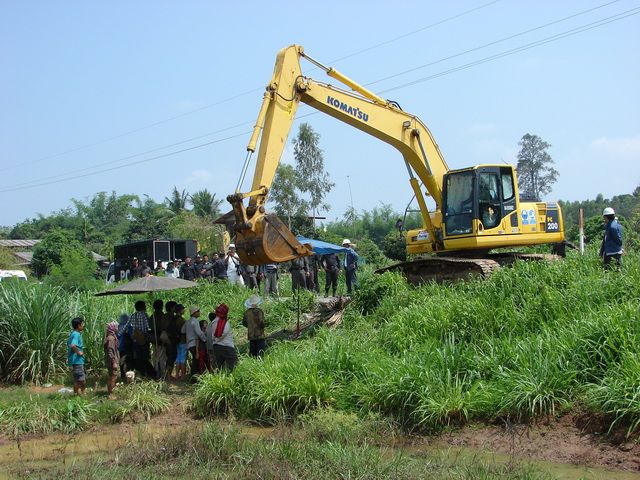UDON THANI – Sanong Chaiyanataan sits on his porch in Kumphawapi district, transmission towers fading out of sight in either direction. There is a pit in his backyard and 15 people have been arrested on his land.
Just 24 hours earlier, on Friday morning, the Electricity Generating Authority of Thailand (EGAT) tried to push ahead with plans to erect two 500-kV transmission towers on Mr. Sanong’s property despite his rejection of an inadequate compensation offer. EGAT’s attempt to gain entry, however, was met by a group of 30 neighbors and student activists blocking the entrance to Mr. Sanong’s land in Ban Lao Kluay village. That afternoon, Udon Thani Police dispelled the protest, arrested 15 demonstrators, and opened the path for a backhoe to begin the construction the state enterprise has long awaited.
In 2007, EGAT began planning a power transmission line from Nam Ngum 2 Dam in Laos to Udon Thani in Northeast Thailand. At first, a community action group sprung up to fight the line’s development, but recently their membership numbers have dwindled into the low teens. EGAT has managed to strike enough deals with Isaan’s landowners to erect more than 150 transmission towers, and now it must construct only three more in order to complete the project.
Though the line of transmission towers extends as far as the eye can see, Mr. Sanong and his siblings refused to sell EGAT this final access point since the family was never offered the market price of their land.
“We want this project to be canceled but we are open to negotiations with EGAT,” explained Adoon Bhunyarot, Mr. Sanong’s brother-in-law and co-owner of the land. “We have invested 60,000 baht to prepare the land to build a house here. The property is worth 700,000 baht and EGAT wants to pay us only 100,000 baht. This property has been a 16-year investment,” he added.
Udon Thani EGAT officials declined to comment.
Ban Lao Kluay locals are particularly disgruntled because they claim that EGAT disregarded the National Human Rights Commission’s May 25th resolution to pause construction until the company reaches an agreement with the landowners. Now, EGAT has moved ahead with its plans for construction without Mr. Sanong’s consent, and those arrested face charges for violating the Energy Industry Act of 2007, a law that authorizes EGAT to access any and all land it needs.
The inevitable complications with eminent domain, however, were not the only concerns of Friday’s protesters. When Ban Lao Kluay inhabitants began their fight against EGAT four years ago, they sought the help of nearby Ban Sang Khom, a village well known for its community organizing in an 11-year battle against a proposed potash mine. Mani Boonrod, a Ban Sang Khom local and figurehead of the anti-mining movement, attended the protest at Mr. Sanong’s home with fears of her own.
“Villagers [in Ban Sang Khom] know that this electricity project is not for ordinary people, us, but for the potash-mine company,” the Udon Preservation Network’s leader said. “The power lines will affect local villagers’ farming, but the potash mine will affect their health.”
Ban Lao Kluay villagers are also convinced the power will not be allocated for local community members, who use very little electricity themselves, but rather for large-scale development projects such as mines.
“What is this project even for?” Mr. Sanong asked, looking down into the fresh pit in his field. “We villagers have enough energy here. We don’t use nearly as much as the factories.”
As Mr. Sanong sat back down on his porch, an NGO activist, who asked to remain anonymous, probed him further. “Some people fight for their lives, some people fight for their dignity. What are you fighting for?”
Mr. Sanong shook his head and flashed a smile. He said nothing in response.
[UPDATE: June 1, 2011 – “EGAT Protection Act of 1968” has been changed to “Energy Industry Act of 2007.”]





